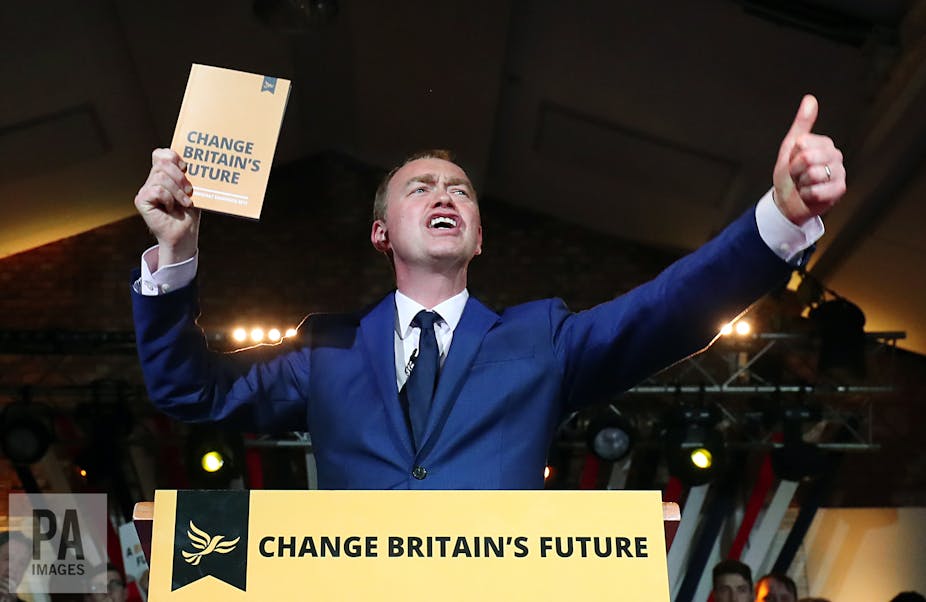Call me a radical, but I think people should vote for the party that will do the most to increase happiness. If a party’s policies won’t reduce misery and help people have more pleasant, fulfilling lives, what are they good for?
To figure out who will make Britain happiest, I slogged through all 314 pages of the manifestos of the three main parties represented at Westminster that are fielding candidates across the UK to analyse their policies.
We can’t precisely quantify happiness, but making educated guesses about what will make a difference is easier than you’d expect. Psychologists and economists have been studying happiness for the past 60 years, typically through survey questions such as “on a scale of one to ten, how satisfied are you with your life overall?” There are three main findings that simplify things.
First, hedonic adaptation. In short, we get used to stuff. The most famous finding is the Easterlin Paradox: although we have become much richer since the 1960s, overall happiness hasn’t increased. Hedonic adaptation is why you can’t cope when the wifi goes down, even though humanity survived for 100,000 years without it.
Second, social comparison. Improvements for some can make others feel worse, which means happiness doesn’t increase overall. In other words, your Ferrari makes my Lamborghini feel slow.

Third, failures of affective forecasting (“affect” is psychologist-speak for “emotion”). We’re surprisingly bad predictors of how we’ll feel in future, largely because we don’t take hedonic adaptation or social comparison in account. We see Kanye in his Ferrari and think “I wish I had his car” while he’s thinking “this traffic is lame. Also, I still can’t believe Taylor Swift won that thing.”
Suddenly, the analysis is much easier. Most policies act indirectly, by changing the world around us. International trade regulations (i.e. Brexit), the economy, immigration, democratic reform, etc. may seem important, but are quite remote from our day-to-day lives. In the words of economics Nobel laureate Daniel Kahneman: “nothing matters as much as you think it does when you’re thinking about it”.
We just need to concentrate on those that affect people’s happiness directly by changing how they think or feel. While you might be bothered by Brexit, being depressed will ruin your whole day.
Devil’s in the detail
I went through each of the Tory, Labour and Lib Dem manifestos and wrote down every specific manifesto promise I thought would directly improve people’s lives. I’ve broken these into some key policies areas and I’ll explain which party I thought “won” in each category. I’ve put my results in the table at the bottom.
National level: Only the Lib Dems committed to publishing a national well-being strategy and having a public well-being campaign (a bit like the “five-a-day” one for healthy eating). These could be very important: if we can increase everyone’s happiness just a little bit, that will have a bigger impact than helping a few people by a lot. The Tories want a “breathing space” scheme for debt relief, which might relieve some stress. Labour wants four new national holidays, which is probably good. A strong victory for the Lib Dems here.
Health: Mental health is the single most important issue if we want to increase happiness. All three parties promised more money for mental health. Only the Lib Dems promised to raise taxes and ring-fence some of that money for mental health. They also promised shorter waiting times and a dedicated service for children. Marginal Lib Dem win.
Work: The Tories want to put mental health first aid into employer health and safety. They also promised tax breaks for companies that employ those with chronic mental health disorders, disabilities or longer unemployed.
Unemployment is very bad for happiness. The Lib Dems promised a “well-being premium” for employers that support mental health but it’s very vague. Small Tory victory.
Schools: Lib Dems want the promotion of well-being to be included in Ofsted inspections, which is excellent. Labour wants a new measure of child health including mental and dental health. All three parties want to teach children life skills, including social media, and to tackle bullying. Labour and Lib Dems promised more counselling in schools. Medium Lib Dem win over Labour. Small Labour win over the Tories.
Environment: Although they are indirect, research shows air quality and green spaces are surprisingly important for happiness. Both Lib Dems and Labour want a new act regulating pollution (but the Lib Dems go further). All three parties wanted to plant trees, but only the Lib Dems offered new national parks. Small Lib Dem win.
Crime: People are always going to take drugs, but the Lib Dem plan to legalise cannabis will probably reduce crime by taking revenue away from gangs. And it should improve public health if people use cannabis instead of new, untested new drugs such as Spice. Lib Dem win, size uncertain.
Animals: Clearly, we don’t just care about humans. Labour and the Lib Dems want to increase sentences for animal cruelty. The Tories want CCTV in slaughterhouses but also want to vote on fox hunting. Probably a draw.
Foreign aid: This is Britain’s biggest opportunity to make other people happy. Sadly, none of the parties stood out. Draw.
Who wins?
The Lib Dems are the clear overall winners, having won in most categories. Tories are second, Labour third. My subjective, entirely arbitrary scores are Lib Dems 8/10, Tories 5/10, Labour 4/10.
Finally, there are some important happiness policies none of the parties mentioned. On my list: measuring policies using life-satisfaction scores; making it easier to test drugs for mental health research (oddly enough, ketamine and magic mushrooms may help with depression); improving life for animals in factory farms; encouraging more culture, exercise and volunteering; finding ways to reduce social isolation.
While reforming drug laws divides opinion, none of the other policies ought to. Our happiness is what really matters. We should vote for the politicians that take it seriously.

